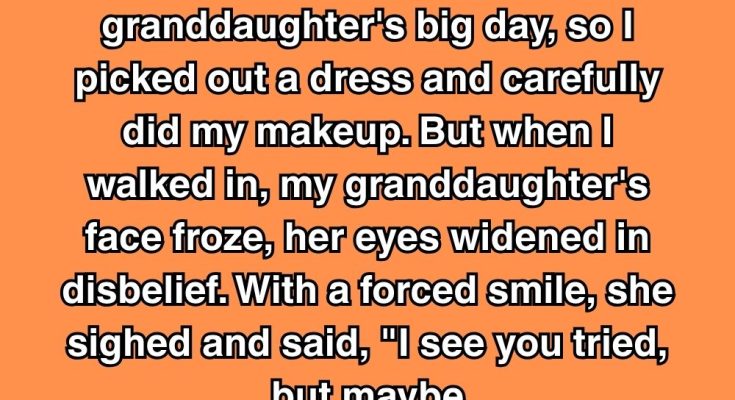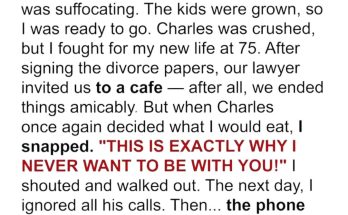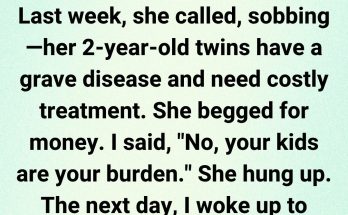At first, I thought she was joking.
We always joked. Well, we used to. But then she glanced at her bridesmaids and pulled me aside by the elbow like I was a clumsy child.“Lola,” she whispered, “I just don’t want any distractions.
You understand, right? You showing up like this… it’s not really the vibe.”
I stared at her, speechless. The room was bright and full of laughter, camera flashes bouncing off the mirrors.
I’d worn my cream-colored lace dress—not white, not even close. My makeup was soft, just a bit of mascara, blush, and lipstick I hadn’t worn in years. But she looked at me like I’d walked in wearing a clown suit.
I was 72, not senile. And not invisible. My name is Lourdes.
Everyone calls me Lola. Born and raised in Cebu, moved to the U.S. in ‘78.
I’ve buried two husbands, raised four kids, and helped raise nine grandkids. This wedding wasn’t just a party—it was a milestone for our family. But in that moment, all I felt was shame.
“I think it’s better if you head home and rest,” my granddaughter, Sienna, said. Her voice was flat, like she was doing me a favor. The first instinct I had was to turn around and leave.
Let her have her picture-perfect wedding. But something in me hesitated. I looked over at my son, Renzo—her father.
He was laughing with the groom’s uncle, holding a drink, completely unaware of what just happened. “Okay,” I said softly. “I understand.”
I didn’t.
I walked out without making a scene. Sat in my car, hands trembling, staring out the windshield at the bright blue sky. The bouquet I’d brought sat on the passenger seat, still fresh, still full.
It was from my garden—roses, jasmine, and bougainvillea. She used to pick those with me when she was little. A security guy knocked on my window after about 30 minutes.
“Ma’am, are you alright?”
I wasn’t. But I smiled and nodded. The drive home felt longer than it should’ve.
I changed out of my dress the moment I stepped through the door. Washed my face. Sat in silence.
I didn’t cry—not yet. Instead, I made a cup of tea, the way I always do when my heart gets heavy. Ginger, lemongrass, and a little honey.
I thought about calling Renzo. But what would I even say? “Hey, your daughter uninvited me from her wedding because I looked too lola-glam”?
It sounded ridiculous. The worst part was that I wasn’t angry. Not yet.
I was confused. Hurt. And, God help me, embarrassed.
That night, I sat scrolling through Facebook. Photos from the wedding were already going up. There she was—my beautiful Sienna—in her sleek ivory gown, surrounded by her friends.
My family. Laughing. Posing.
Dancing. I wasn’t in a single shot. No mention of me, no tag, not even a “wish my lola could be here.” Nothing.
But the twist came two days later, in the form of a text from her mother, Liza. My daughter-in-law. “Hi Ma, hope you’re feeling better.
Sienna mentioned you weren’t feeling well that day? Just checking in 💕.”
I blinked. “Wasn’t feeling well”?
That’s the story they told? I nearly threw my phone across the room. Instead, I typed a short reply: “I’m fine.
I was there. Ask Sienna why I left.”
I left it at that. No response.
A week passed. No call, no apology. Nothing.
I tried to move on, but something inside me ached in a way I hadn’t felt in years. I kept remembering how, when Sienna was small, she’d tug on my apron and say, “When I get married, will you make my veil?” And I did. I hand-stitched the lace veil she wore.
With trembling fingers. With love. And she erased me like a smudge on a window.
I wasn’t ready to confront her, but I needed someone to hear me. So I told my cousin Inday. She lives three blocks away, has zero filter, and still believes in manners.
The moment I told her, she sucked her teeth so loud the dog barked. “She told you to go home? For looking too nice?
Ay ambot, these young people.”
“Inday—”
“No. No excuses. Your only sin was upstaging her by existing.”
That made me laugh, a short, bitter sound.
She poured me mango juice and we sat at her table for hours. Then, she said something I didn’t expect: “You should go on Facebook.”
“I already saw the photos—”
“No. Not to stalk.
To speak. You’re always quiet, always graceful. But sometimes, the truth needs to breathe.”
I hesitated.
I wasn’t one to air things online. But as the days passed, that ache didn’t go away. I wasn’t sleeping well.
I stopped tending my garden. And that veil—my hands had spent six weeks on it—felt like a joke now. So I wrote a post.
I didn’t name names. I didn’t insult or accuse. I just told the truth.
“Last weekend, I dressed up to attend a family wedding I was looking forward to for months. When I arrived, I was quietly asked to leave—because I didn’t ‘fit the vibe.’ I left without making a scene. But my heart is still heavy.
Not because of the dress or the makeup—but because I was made to feel like an inconvenience at my own family’s milestone. To all the elders reading this: You are not invisible. You are not embarrassing.
You belong in every room your love helped build.”
I closed my laptop and made another cup of tea. Within an hour, my notifications exploded. Over 300 likes.
Dozens of comments. Strangers, neighbors, even old church friends chimed in. “Lola Lourdes, I’m crying.
This happened to my mom last year.”
“You looked stunning! Shame on whoever did that.”
“Thank you for speaking up. My daughter told my mom not to wear her hearing aids at my wedding ‘because they’d clash with the aesthetic.’ My mom didn’t come.”
It was like a dam had broken.
People poured their own wounds into the comments. Quiet heartbreaks. The way our culture glorifies youth and sidelines elders.
It wasn’t just about a dress. It was about erasure. Three days later, Renzo showed up at my door.
He had tears in his eyes. “Ma,” he said. “Why didn’t you tell me?”
I looked at him for a long moment.
“She’s your daughter. I didn’t want to ruin her day.”
“She ruined it herself,” he muttered. “Sienna lied to us.
She said you decided not to come last minute. That you weren’t feeling well. She didn’t tell anyone she asked you to leave.”
I stayed quiet.
“She said you were dressed… too formally. That people were staring. And then she said something that made me sick.”
“What?”
“She said, ‘I just didn’t want people asking if she was the bride.’”
I blinked.
That made no sense. “I’m seventy-two!”
“I know,” he said. “But Ma, you looked radiant.
People did ask who you were. They asked if you were her aunt. Or an old friend.
Maybe that threatened her, I don’t know.”
I didn’t know whether to laugh or cry. I chose neither. “Has she reached out?” I asked.
“No,” he admitted. “But she saw the post. Everyone did.
Even her husband’s family.”
Apparently, there was a bit of an uproar. The groom’s mother commented anonymously—“Elders are the roots of the tree. You don’t chop the roots to look prettier for the photo.”
That comment went semi-viral.
People shared it on wedding planning forums. Others added their own stories. My quiet little truth had grown legs.
And then, one morning, I got a knock on the door. It was Sienna. She looked small.
Not physically—just… smaller than the girl I once knew. “Lola,” she whispered. “Can I come in?”
I didn’t move at first.
Then, I opened the door wider. She stood in the living room for a long time, fiddling with her hands. “I messed up.”
I said nothing.
“I panicked. I thought… I don’t know. I was worried about photos.
About people asking weird questions. About being compared.”
Still, I said nothing. “I was selfish.
And then I lied about it. And then I saw your post. And I felt—ashamed.
Not because of what people said. But because it was true.”
I looked at her, finally. “You know what hurt most?” I said.
“It wasn’t being asked to leave. It was realizing you didn’t see me.”
Her lip trembled. “I made your veil,” I added.
“You wore it. Even when you didn’t want me in the room, you wore my work.”
She started crying. “I didn’t deserve it,” she whispered.
“No,” I said. “But you were always my granddaughter. And love doesn’t disappear overnight.”
She fell into my arms and cried like she was six years old again.
We talked for hours. She didn’t excuse it—she owned it. Fully.
And that made all the difference. I told her I wouldn’t delete the post. It wasn’t meant to punish—it was meant to show what happens when we forget the shoulders we stand on.
She agreed. She even shared it herself, later, with her own caption:
“We hurt the people we love in ways we don’t always see. I hurt my lola, and I’m still earning her forgiveness.
I share this so I can be held accountable—and so others won’t make the same mistake.”
In the weeks that followed, something beautiful happened. Older relatives started getting calls. Invitations.
Apologies. One of my friends, Florencia, told me her granddaughter asked her to be the flower girl in her vow renewal. I smiled.
“Good. About time.”
As for Sienna—she and I are rebuilding. Slowly, tenderly.
She comes over for tea now. Picks flowers from my garden. We’re working on a scrapbook of the wedding—not the photos, but the behind-the-scenes.
She asked me to help narrate it. My version of things. “I want your voice in it, Lola,” she said.
“For real this time.”
So yes, I was erased once. But not forever. And if you’ve ever been made to feel invisible at your own family’s table—please know: your presence matters more than any curated aesthetic.
Don’t let anyone dim your light to protect their insecurity. We don’t age out of relevance. We become the roots.
If this moved you, please like and share. You never know which elder needs to read it today.


